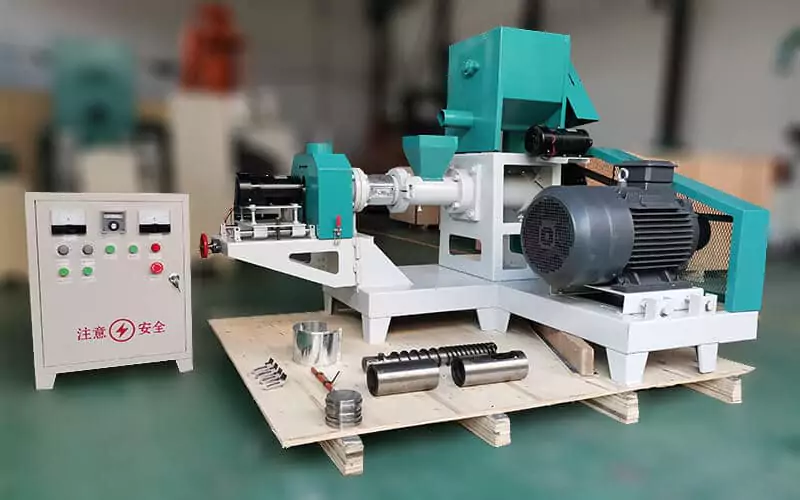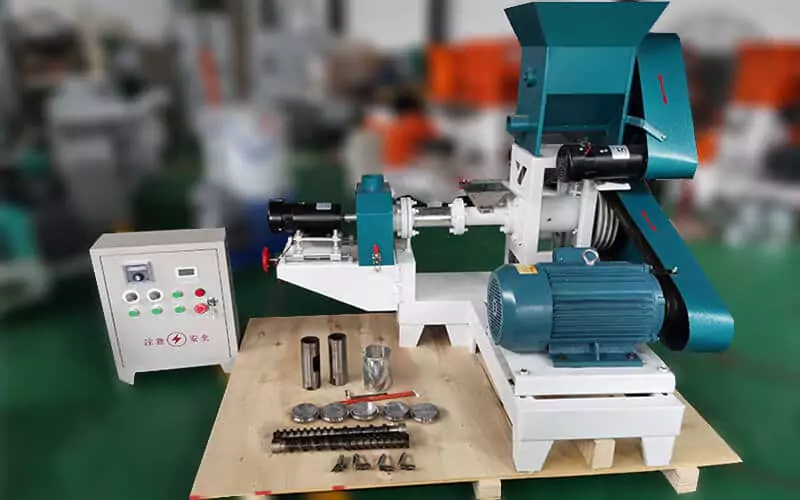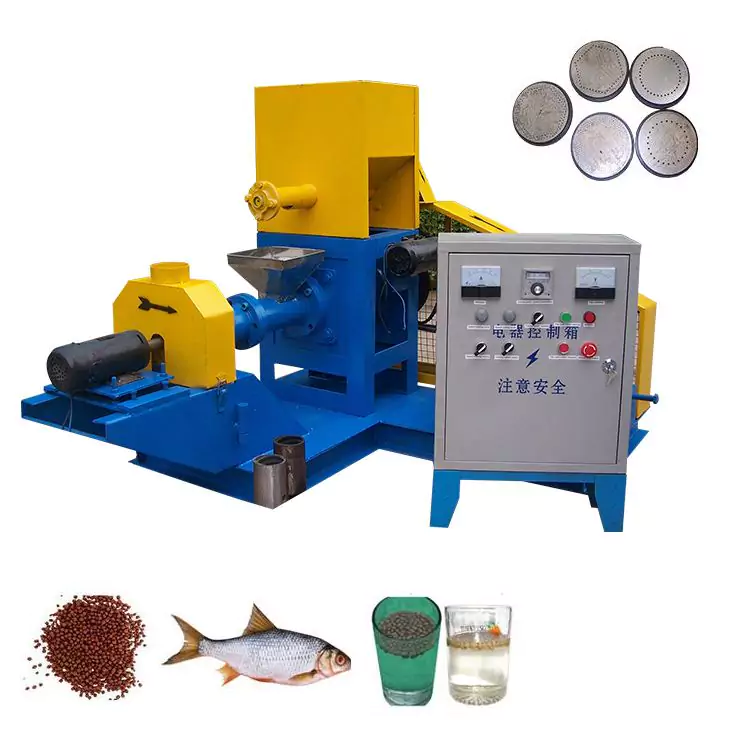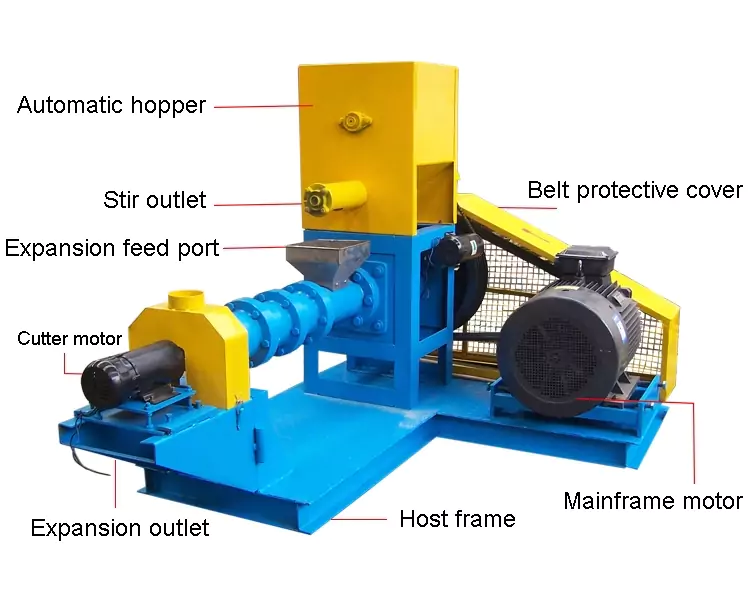Introduction
For fish farmers across Nigeria, especially those raising catfish and tilapia, the biggest challenge is often the high cost of quality floating feed. It can feel like your profits are being eaten up before your fish even take a bite. An on-farm fish feed making machine is a powerful tool for the farmers in Nigeria. It helps you slash costs, control the quality of your feed, and boost your farm’s profitability.
This guide is written for you, the Nigerian fish farmer. We’ll cover the benefits of these machines. We will also look at the key machines you need, where to find them, and what to look for when buying. We will also help you think about the cost in Naira.
video of floating fish feed pelleting machine in Nigeria
Why a Fish Feed Machine is a Game-Changer for Nigerian Aquaculture
Investing in your own fish feed making machine in Nigeria offers clear, practical advantages for your farm in Nigeria.
Unlock Business Potential
You can sell your excess, high-quality floating feed to other local fish farmers in your area. This can become a new source of income.
Drastically Cut Your Feed Costs
You can use local ingredients like maize, soya, and groundnut cake. This is much cheaper than buying expensive pre-bagged commercial feed every week.
Produce High-Quality Floating Feed
This is crucial for catfish and tilapia farming in Nigeria. Floating feed reduces waste because you can see the fish eat. It also helps prevent water pollution from uneaten feed.
Control Your Ingredients, Control Your Growth
You can ensure your feed has the right protein level for fast growth. You can also make sure it is free from the poor-quality fillers sometimes found in the market.
The Most Important Machine for Nigerian Fish Farmers: The Feed Extruder
It’s very important to know about the main fish feed making machine in Nigeria you will need.
Extruder vs. a Simple Pellet Mill
A standard pellet mill makes dense pellets that sink. This is good for some animals, but not ideal for the most popular farmed fish in Nigeria. An extruder is the specific machine you need to make the floating feed that catfish farmers want.
Why the Extruder is Key for Catfish & Tilapia
“An extruder is a special machine that cooks the feed under high pressure. This process makes the pellets expand and float on water. Since most catfish and tilapia in Nigeria are raised in ponds where they feed at the surface, floating feed is essential, and an extruder is the machine that makes it.”


Finding Suppliers in Nigeria: Where to Look
Finding a good supplier of fish feed making machine in Nigeria is a key step in the process.
Major Commercial Hubs: Lagos, Ibadan, Port Harcourt, and Onitsha
These cities are the primary centers for machinery importers and dealers in Nigeria. You will find the largest selection here.
Look for Specialized Aquaculture & Agricultural Equipment Dealers
It is best to seek out dealers who understand the specific needs of fish farming, not just general-purpose sellers.
Use Online Platforms & Farmer Networks
You can search on popular platforms in Nigeria like Jiji.ng. You can also ask for trusted supplier recommendations in Nigerian aquaculture groups on Facebook and WhatsApp.
Local Fabricators vs. Imported Machines
You can find local workshops that build these machines. This can be a cheaper option, and repairs may be easier. However, an imported machine (often from China or Europe) usually offers more precision and may be more durable.


Is it profitable to start a fish feed production business in Nigeria?
A: Starting a fish feed production business in Nigeria can be profitable, and here’s why:
1. Growing Aquaculture Sector: Nigeria has witnessed a rise in fish farming, creating demand for high-quality fish feed.
2. Import Dependency: A significant portion of fish feed used in Nigeria is imported. Producing locally can reduce costs and dependency on imports.
3. Natural Resources: Nigeria boasts numerous raw materials required for fish feed production in Nigeria, like maize and soybeans.
4. Employment Opportunities: This venture can create jobs, supporting the local economy.
5. Market Potential: With a vast population and growing middle class, there’s a potential market for fish products, driving the demand for fish feed.
However, success in this business isn’t guaranteed. It’s crucial to conduct a thorough market analysis, understand the needs of fish farmers, and ensure consistent quality to stay competitive.
How much does it cost to start a fish farming in Nigeria?
A: The cost to begin fish farming in Nigeria varies based on multiple factors. However, to give a general overview:
1. Land Acquisition:
The cost of land varies by region. In urban areas, it can be higher compared to rural regions. On average, one could spend between ₦100,000 to ₦500,000 or more per plot.
2. Pond Construction:
Earthen ponds are common and relatively cheaper. Constructing one might cost from ₦50,000 to ₦300,000, depending on size and complexity.
3. Water Supply:
Having a steady water source, like boreholes, is essential. Setting this up could range from ₦100,000 to ₦500,000.
4. Fish Fingerlings/Juveniles:
The price varies based on species and age. Generally, a catfish fingerling might cost between ₦10 to ₦30 each.
5. Fish Feed:
Feed is a recurring cost. Initially, for a small-scale farm, one might budget between ₦200,000 to ₦500,000.
6. Labor and Training:
Hiring workers or undergoing training sessions may add ₦50,000 to ₦200,000, depending on the scale.
7. Miscellaneous Costs:
This includes costs for electricity, medications, and more, potentially adding another ₦50,000 to ₦150,000.
In summary, starting a small to medium-sized fish farming in Nigeria could range from ₦500,000 to ₦2,500,000 or more. It’s essential to do a thorough market survey and financial planning to get accurate figures tailored to specific needs and locations.
how to start fish farming business in Nigeria?
Fish farming, often called aquaculture, is a vibrant sector in Nigeria. To make money from it, consider these steps:
1. Research and Training:
Start with gaining knowledge about different fish species, their needs, and the market demand. Workshops, online courses, and local experts can be invaluable.
2. Choose the Right Fish Species:
Catfish and tilapia are popular in Nigeria. Selecting the right fish species based on your target market and location is crucial.
3. Location Matters:
Ensure access to clean water and a conducive environment. Proximity to markets can reduce transportation costs.
4. Quality Feed:
Invest in good quality feed. It’s vital for fish growth and health, and it directly impacts your profits.
5. Regular Health Checks:
Monitor fish health. Healthy fish fetch better prices and reduce losses.
6. Effective Marketing:
Build relationships with local restaurants, markets, and processors. Online platforms can also help you reach wider audiences.
7. Diversification:
Consider integrating other related businesses like fish feed production or fish processing in Nigeria. This can boost your income sources.
8. Stay Updated:
The aquaculture industry evolves. Keep learning, and adapt to new techniques and technologies.
Remember, while fish farming has its rewards, it requires dedication, investment, and patience. Consistent quality and customer trust are key to long-term profitability.
FAQ
What is the best machine for making catfish feed in Nigeria?
A: A fish feed extruder. This is because it makes the floating feed that is ideal for raising catfish and tilapia in ponds, which is the most common method in Nigeria. Floating feed allows you to see your fish eat and reduces waste.
How much does a small fish feed extruder cost in Nigeria?
A: Prices can vary a lot, but a small, basic extruder that is good for a small to medium farm might start from around ₦600,000 to ₦1,500,000. It is essential to get current prices from different suppliers as they can change.
Is a diesel or electric machine better for Nigeria?
A: A diesel engine model is often a safer choice for many farmers in Nigeria. This is due to the inconsistent public power supply. If you have a large, reliable generator or are located in an area with very stable electricity, an electric model can be cheaper to run.
Where can I buy a fish feed machine in Lagos?
A: You can start by looking for agricultural machinery dealers in major market areas. Areas known for machinery and industrial supplies, like those around Oshodi, Mushin, or the trade fair complex area, are good places to start your search.
Can I use local ingredients like cassava and GNC in these machines?
A: Yes, absolutely. That is one of the main benefits. These machines are designed to work very well with common Nigerian feed ingredients like cassava (for energy) and Groundnut Cake (GNC) (for protein).
Conclusion
For Nigerian fish farmers, a feed making machine, especially a fish feed extruder, is a key investment. It helps you slash costs and take control of the most important part of your business. By understanding your needs and choosing the right machine, you can master your farm’s biggest expense and pave the way for success.

